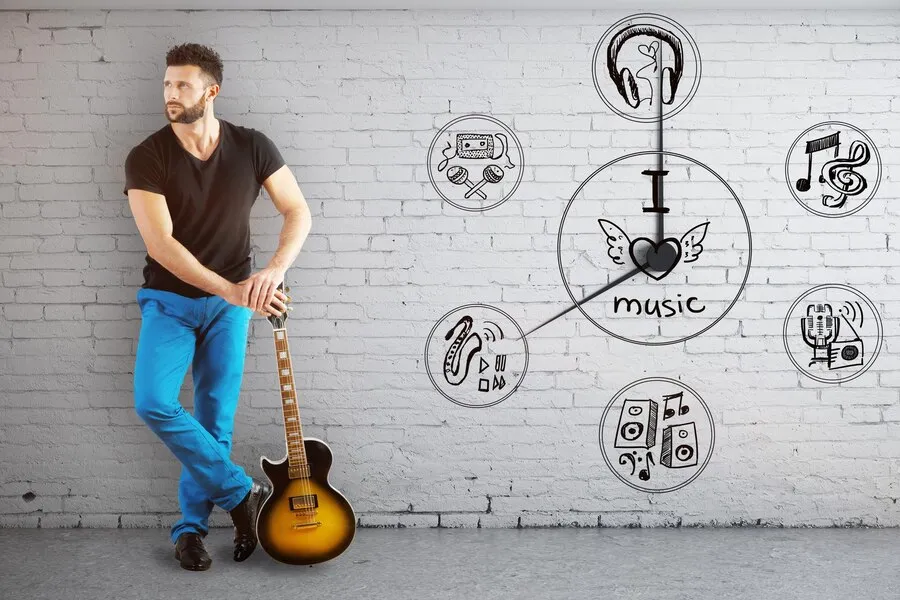Table of Contents
Music is significant in our lives, resonating with the rhythm of our emotions and thoughts. Its profound influence extends beyond simple entertainment, intertwining seamlessly with our mental and emotional landscape. Engaging with music offers us a unique avenue to explore mental well-being and personal growth.
Researchers and therapists alike recognize the transformative potential of music. According to a Harvard Health article, music can significantly improve mental health by connecting to improved emotional and psychological well-being. Integrating music into our daily routines can significantly change mood, cognition, and overall well-being, making it a crucial tool in our self-help arsenal.
The Power of Music on Emotion
Music is a strong form of expression that can trigger various emotions, ranging from happiness and excitement to melancholy and yearning. This ability to resonate with our feelings makes it an essential tool for emotional regulation. Studies indicate that music can stimulate the brain’s reward centers, releasing feel-good chemicals such as dopamine and oxytocin. These neurochemical changes can lead to increased feelings of pleasure and connection, making music an invaluable ally in managing the ebb and flow of our emotional states. Whether it’s a lively tune that lifts our spirits or a tranquil melody calming our nerves, music contributes substantially to our presidential debate children’s book and broader emotional experiences.
Consider how a song associated with a cherished memory can instantly transport you to that moment, evoking a flood of emotions. This reaction highlights the profound impact sound can have on our psyche. By carefully selecting the music we listen to, we can reinforce positive emotions, process negative ones, and create a personalized therapeutic soundtrack that mirrors and influences our emotional journey.
Music and Its Effect on Mental Health
The soothing quality of music can significantly reduce anxiety and stress, acting as a balm for the restless mind. Scientific research shows that listening to music decreases cortisol levels, the hormone linked to stress, which helps to induce relaxation. For those suffering from mental health issues, therapeutic music interventions have been shown to serve as an effective complementary treatment method.
Incorporating music into therapeutic practices allows individuals to explore and express emotions that might be difficult to articulate through words. Methods such as music therapy can provide significant relief for individuals experiencing mood disorders, including depression and anxiety. Enabling patients to engage through active and passive music activities provides a creative outlet for expression, assisting in navigating complex emotions and thoughts.
Using Music as a Coping Mechanism
Music offers a valuable coping mechanism for those navigating stress or emotional turbulence. The right music can shift perspectives and manage moods effectively, whether it’s fast-paced beats to energize or soft tunes to promote relaxation. Creating personalized playlists becomes a journey of self-discovery, where individuals can tailor their listening experiences to highlight positive emotions or provide solace during challenging times.
Matching music with specific emotional needs allows for a holistic approach to self-care. By consciously curating playlists for different moods or activities, individuals can harness the therapeutic properties of music to cultivate resilience and foster emotional health.
Also Read: Can Chiropractic Treatment Lead to Injury or Death?
Music Therapy: An Effective Treatment Modality
Music therapy involves structured interactions using music to achieve therapeutic goals, offering a noninvasive and engaging approach to treatment. Its benefits are well-documented, from alleviating pain to improving cognitive function. Therapists employ instruments, songwriting, or listening sessions to connect with clients on an emotional level. This connection is supported by numerous success stories and research, such as the documented evidence in a Psychology Today article highlighting music therapy’s positive impact.
People with mental health issues like PTSD, autism spectrum disorders, or traumatic brain injuries have found music therapy to be crucial in their recovery and treatment journeys. Therapists can facilitate healing and promote emotional well-being by cultivating an environment where musical expression is encouraged.
Music’s Role in Personal Development
Playing a musical instrument or participating in musical activities greatly benefits brain development. Engaging in activities with rhythm and melody improves neural plasticity, which is the brain’s capacity to create new neural connections by reorganizing itself. This development positively impacts cognitive skills, such as memory retention and attention, while fostering personal growth by increasing self-esteem and providing a sense of accomplishment.
The discipline and patience required to master an instrument translate into valuable life skills. By challenging oneself through musical pursuits, individuals experience personal growth and intellectual development, laying a foundation for lifelong learning and creativity.
The Influence of Music on Social Connections
Music is a universal language, forming connections where words may fall short. Participating in group activities, such as choirs or bands, nurtures musical talents and builds a sense of community. Through shared musical experiences, individuals can reduce feelings of isolation and foster a supportive social environment.
Cultural or social music events further promote inclusivity and more comprehensive social bonds. Festivals, concerts, and open mic nights allow diverse individuals to unite, celebrate creativity, and forge lasting friendships.
Music and Creativity
Creativity thrives in environments enriched with music. The dynamic interplay between sound and imagination inspires art, innovation, and problem-solving. Many renowned creators and professionals cite music as a catalyst for their creative processes, attributing pivotal moments to musical inspiration.
Music’s ability to foster creativity is reflected in its capacity to influence mood and emotion. This allows individuals to tap into deeper levels of innovation and expression. By integrating music into creative practices, individuals can unlock new dimensions of thinking and broaden their artistic horizons.
Practical Tips for Integrating Music into Daily Life
Incorporating music into everyday routines doesn’t require grand gestures. Simple practices like morning playlists to energize the day or calming melodies during evening routines can significantly impact the quality of life. Exploring online tools or apps for music discovery can further enrich one’s musical journey and enhance daily experiences.
By establishing a routine involving regular music engagement, individuals can cultivate a more mindful and centered lifestyle. Music as a backdrop for various activities, such as exercise, meditation, or cleaning, can infuse energy and joy into everyday tasks.






